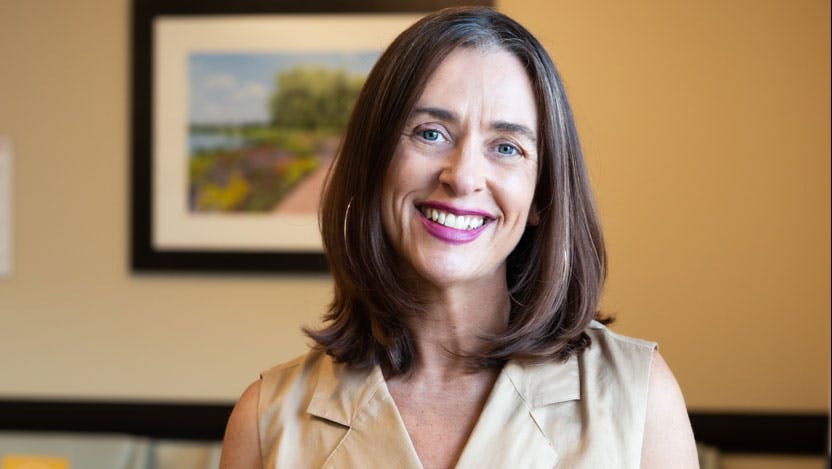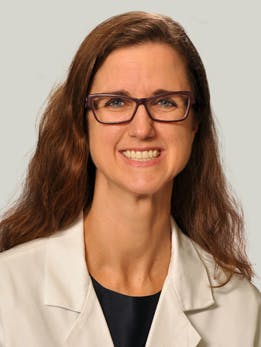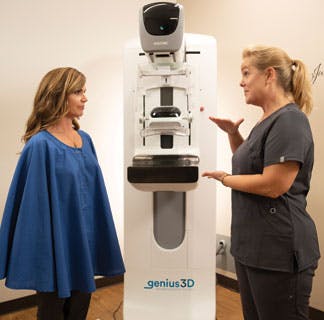'I feel extremely lucky': Early detection and timely care is key to breast cancer treatment

Bonnie Svoboda spent 10 years caring for her father, who suffered from dementia and other medical issues. When he died last year, it was time to pay better attention to her own health. Svoboda lost weight, made regular care appointments for herself and was feeling healthy. The one thing she still needed to do was schedule a mammogram.
She did perform regular breast self-exams, and in December of 2020, felt a lump. Like many women, she tried to ignore it at first.
“I thought it was likely hormonal, but this was different,” said Svoboda, who lives in Orland Park. “Some days it was there, some days it wasn’t. Then I thought, it's a lump. I should get it checked out.”
After doing research, she chose to get tested at UChicago Medicine Orland Park.
“They had the things that I was looking for in a mammogram, with 3D technology and comfort,” she said.
Her screening mammogram at UChicago Medicine Orland Park showed something suspicious, so she was called back for a follow-up sonogram. The staff at UChicago Medicine Orland Park scheduled it within a few days.
“The woman who called said, ‘Don’t panic. Just come in on Monday. We’ll take more pictures and get to the bottom of it.’ It was a really quick turnaround where I wasn't driving myself crazy thinking, ‘What's happening?’” Svoboda said.
On her return visit, the radiologist found three masses in her left breast. She was able to get a biopsy the same day, which confirmed invasive ductal carcinoma and ductal carcinoma in situ, stage 1A. Invasive ductal carcinoma is the most common form of breast cancer diagnosed in women. When detected early, it’s the most treatable and curable.
I want other women to know there is help out there, and that they shouldn't ignore signs from their bodies.
With her physician’s advice and the help of the mammography team, Svoboda decided to stay with UChicago Medicine for treatment and surgery.
“I did have other choices, but when I started looking at everything they do, I felt instantly comfortable with my decision,” she said. “It's not only the right care when you're getting the mammogram itself, but you want to make sure you're getting the right follow-up should something happen.”
Svoboda’s surgeon at UChicago Medicine, Nora Jaskowiak, MD, recommended she have a lumpectomy and sentinel node biopsy with reconstructive surgery.
“After the biopsy, it was really terrifying for me. But since I’ve been diagnosed, I had the lumps removed, and then I had the breast reconstructive surgery. I feel extremely lucky that I acted upon it when I did,” Svoboda said.
Jaskowiak said even though Svoboda’s case had a positive outcome, it should serve as a lesson to those who put off getting yearly mammograms and those who develop abnormalities in their breasts.
"Screening mammography saves lives through early detection. We have data to support this,” Jaskowiak said. “If you suspect that there is a problem in your breast, please get it checked out as soon as possible. The earlier the better. Help is here.”
Today, Svoboda goes in for routine follow-up visits and says she feels great.
“I want other women to know there is help out there, and that they shouldn't ignore signs from their bodies," she said.

Nora Jaskowiak, MD
Nora Jaskowiak, MD, is an expert in breast surgery and breast cancer, and also specializes in the surgical management of endocrine disorders, including thyroid cancer and parathyroid conditions. She serves as surgical director of UChicago Medicine's Breast Center.
View Dr. Jaskowiak's physician profile
A Comfortable Mammogram?
New breast screening technologies, like breast-shaped mammogram paddles and high-speed MRIs, are helping make breast cancer testing more comfortable, accurate and convenient.
Learn more